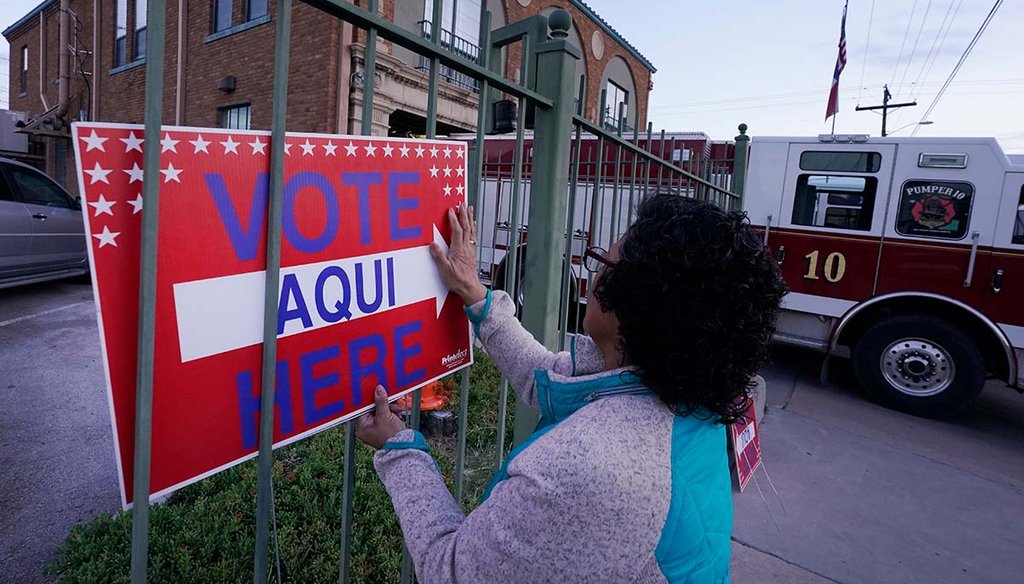

Our only agenda is to publish the truth so you can be an informed participant in democracy.
We need your help.


Election worker Ramona Ortiz places a sign Nov. 8, 2022, outside an El Paso, Texas, a polling station. (AP)
The U.S. Constitution, not any state’s constitution, sets the qualifications to run for president. They are limited to natural-born citizenship, age (35 by Inauguration Day) and residency in the United States (14 years).
Having a felony conviction does not bar Trump from running for president.
Former President Donald Trump’s felony convictions have led to a lot of questions about what he can and can’t do with a criminal record. He will likely be able to vote in November. He can’t possess firearms. He can run for president.
A June 8 Threads post said Trump’s conviction means he can’t appear on the ballot in the red state of Texas, an important state for the Republican candidate because it delivers 40 electoral college votes.
"Trump can’t be on the Texas ballot because of our state constitution," the post said. It appeared about one week after a Manhattan jury convicted Trump of 34 felony counts of falsifying business records.
The post continued: "The United States Constitution does not prohibit felons from holding elected federal office. However, various federal statutes provide that a conviction may result in loss of or ineligibility for office. Texas law prohibits any person convicted of a felony from being a candidate for public office or holding any public office position. A full pardon restores eligibility to run for office."
The post was flagged as part of Meta’s efforts to combat false news and misinformation on its News Feed. (Read more about our partnership with Meta, which owns Facebook and Instagram.)
The post wrongly states that Texas’ constitution would knock Trump off the ballot.
"The qualifications of federal office are outlined by the U.S. Constitution, not the Texas Constitution," Alicia Phillips Pierce, a spokesperson for Texas’ secretary of state, told PolitiFact in an email.
The Texas secretary of state’s website lists the qualifications for the presidency and does not mention criminal history. That’s because it wouldn’t disqualify a candidate from running for the presidency.
The U.S. Constitution upholds the principle that voters decide who should represent them, and its qualifications are limited to natural-born citizenship, age (35 by Inauguration Day) and residency in the United States (14 years).
Texas election code prohibits anyone who is "finally convicted of a felony" from running for office in the state, but that doesn’t cover the U.S. presidency, which is a federal office, said Mimi Marziani, an adjunct professor at University of Texas at Austin law school who has taught constitutional law.
"It does mean that if Trump were finally convicted — after his appeals, etc. — that he would be ineligible to run for, say, Texas Governor," said Marziani, a lawyer in private practice and former president of the Texas Civil Rights Project, a nonprofit group advocating for voting rights.
Texas election code states that a political party is entitled to have the names of its nominees for president and vice president on the ballot as long as those nominees meet the qualifications "prescribed by federal law."
Andy Taylor, an election lawyer in Texas who has represented many Texas Republicans, agreed that the claim that Trump’s felony conviction bars him from the ballot is wrong.
"Trump can and will be on the ballot in Texas," Taylor said.
People convicted of felonies have run for president in the past. Lyndon LaRouche was convicted in 1988 of tax and mail fraud conspiracy and ran for president multiple times from 1976 to 2004. Eugene Debs was convicted of violating the Espionage Act of 1917 for an anti-war speech, then ran for president under the Socialist Party banner from a federal prison in Alabama in 1920.
Trump faces sentencing July 11. It is unknown whether he will receive jail time.
A Threads post said, "Trump can’t be on the Texas ballot because of our state constitution."
The U.S. Constitution does not state that felony convictions bar someone from running for president, and the federal framework supersedes any state rules on whether someone can run for president.
The state constitution can establish requirements only to run for state office, not a federal office such as president.
We rate this statement False.
RELATED: Read all of PolitiFact’s coverage on Donald Trump indictments
Threads post, June 8, 2024
Texas Secretary of State, Qualifications for All Public Offices, 2022
Texas Attorney General Ken Paxton, Opinion No. KP-0251, May 22, 2019
Texas election code Chapter 141 and Chapter 192, Accessed June 12, 2024
Austin American-Statesman, Paxton: Felons can’t run for office; Texas AG’s opinion comes after felon ran for Austin City Council last year, May 23, 2019
Email interview, Alicia Phillips Pierce, a spokesperson for the Texas Secretary of State, June 12, 2024
Email interview, Rosio Torres-Segura, spokesperson for the Office of Harris County Clerk, June 12, 2024
Email interview, Andy Taylor, Andy Taylor & Associates, P.C., June 13, 2024
Email interview, Mimi Marziani, an adjunct professor at University of Texas at Austin law school and partner at Marziani, Stevens & Gonzalez PLLC, June 13, 2024
Email interview, James Wesolek, spokesperson, Republican Party of Texas, June 13, 2024
Email interview, Sylvia Albert, Common Cause democracy and representation policy counsel, June 13, 2024
In a world of wild talk and fake news, help us stand up for the facts.
